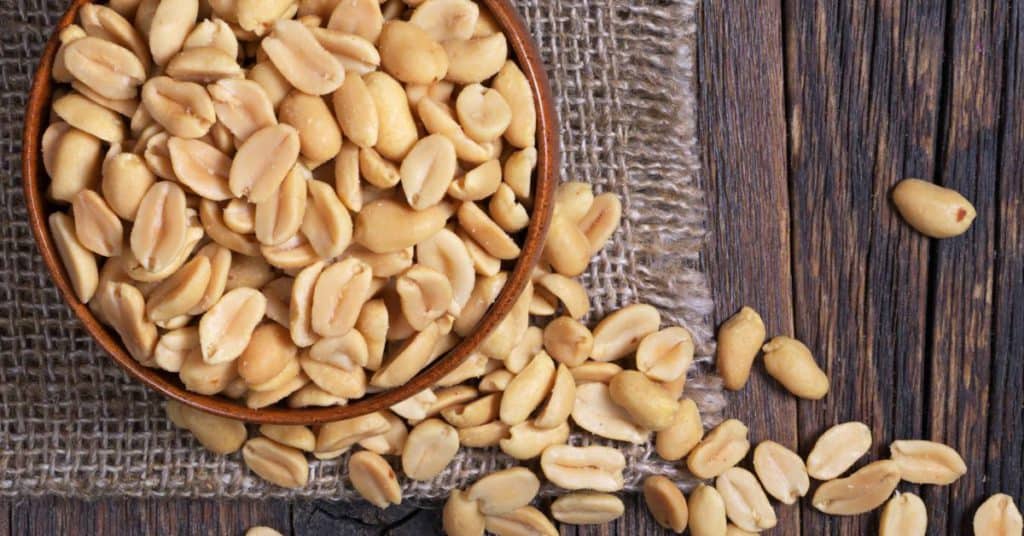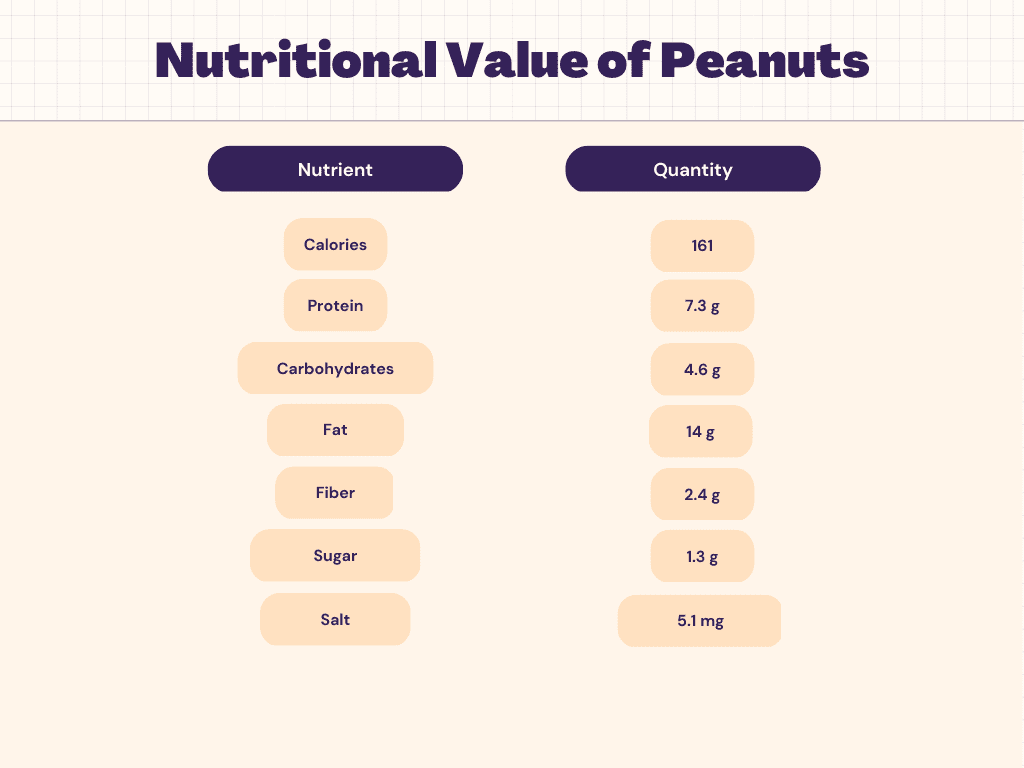The peanut is one of the nuts that people eat the most everywhere (Arachis hypogea). Strangely, however, peanuts aren’t even classed as nuts. Cashews, walnuts, and almonds all grow on trees, whereas peanuts are grown underground in pods. Hence, compared to legumes like peas and soybeans, tree nuts and peanuts are more closely linked to one another.
Nutritional Value of Peanuts
Nutritional Facts of Peanut
Carbs
At 4.6 grams of carbs per ounce, raw peanuts have a low glycemic index (GI) of 14.2, compared to foods with a higher GI, such as white bread (which has a GI of 75) or a bowl of cornflakes, peanuts are less likely to raise your blood sugar levels.
Fats
Each serving of peanuts has 14 grams of fat, the majority of these lipids are thought to be heart-healthy. 3g of Monounsaturated fat (6.9g) and polyunsaturated fat are two of these (4.4g). A serving of peanuts has 1.8g of saturated fat as well.
Protein
Peanuts are a substantial and healthy snack since they provide 7.3 grams of protein per ounce. Peanuts contain all 20 amino acids, with arginine having the highest concentration.
Calories
161 calories are included in a single one-ounce serving of raw peanuts. The nutrition details of peanuts with topping may alter, yet the number of calories may not differ noticeably. Peanuts include 161 calories, of which 78% are from fat, 18% are from protein, and the remaining calories are from carbohydrates.
Health Benefits Of Peanuts
- Lowers the risk of Gallstones – Gallstones are clumps of fluid that form inside the gallbladder and become solid; they frequently contain undissolved cholesterol. Five times a week consumption of peanuts or peanut butter is linked to a lower risk of gallbladder disease.
- Helps with Diabetes – The glycemic index of other meals ingested at the same time can be lowered by the natural fats in peanuts. Both fasting and post-meal blood sugar levels are controlled by peanuts. Check our Diabetes Plans.
- Helps with Weight Management – Peanuts’ protein and fiber help people feel full. Although having a lot of calories, peanuts include some fat that is difficult to digest and isn’t completely absorbed by the body. Check our Weight Loss Plans.
- Keeps the heart healthy – If you are keeping an eye on your blood pressure, use unsalted peanuts to avoid the additional sodium.
Vitamins & Minerals in Peanuts
One ounce of peanuts contains 3.4mg of niacin (21% DV), 2.4mg of vitamin E (16% DV), 0.5mg of manganese (22% DV), 68mcg of folate (17% DV), and 0.2mg of thiamin (16% DV). Unlike many tree nuts, peanuts don’t contain vitamins A or C.
The Bottom Line
The legume known as the peanut (Arachis hypogea) has its roots in South America. They go by several names, including goobers, earthnuts and groundnuts. They are linked to beans, lentils, and soy as legumes. Peanut protein, flour and oil are other items made from peanuts. These products are used in a wide range of cuisines, including sauces, desserts, cakes and confectionery. Protein, fat and other beneficial nutrients are abundant in peanuts. According to studies, peanuts can help you lose weight and may lower your chance of developing heart disease.
FAQs
How many Peanuts can I eat in a day?
One handful of peanuts each day is safe to eat. You can include these in your snack period to stave off hunger between meals. A safe dosage for peanut butter would be 1.5 teaspoons.
Should I eat Peanuts before or after exercise?
Peanut butter on a banana or peanuts mixed into oatmeal can be terrific pre-lifting nourishment, and to get the most out of strength training routines, it’s ideal to have a little protein both before and after. While consuming pre-workout fuel, the idea is to consume a tiny amount so that your stomach won’t feel full while you’re working out.
What are the benefits of Peanuts?
- Lowers risk of Gallstone
- Supports heart health
- Helps with diabetes
- Helps with weight loss
- Reduces the risk of Alzheimer
What is the best time to eat Peanuts?
The morning or daytime are the optimum times to eat peanuts. The perfect late-afternoon snack is peanuts. however, it should be avoided during dinner and before going to bed.










